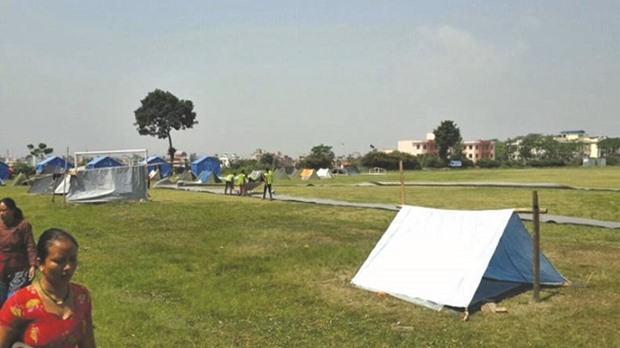Two Generation Amazing (GA) ambassadors who worked tirelessly for 12 months to brave the destruction caused by a devastating earthquake were present on April 28 to see the first of four project funded football pitches open in Nepal.
Karuna Syangtan and Suman Kingring—two of six GA ambassadors in Nepal—worked alongside Nabin Lamichhane, the GA Project Manager of local delivery partner Mercy Corps, to deliver and launch the pitch in the village of Phaparbari.
The Phaparbari pitch is the first of the four earmarked by the GA project of Nepal. A second, in the district of Makwanpur, was launched yesterday with the pitches in Kaski and Kailali scheduled for May 28 and June 4 launches, respectively.
The earthquake—which struck the region on April 25 last year—measured 7.8 on the Richter scale. A second, measuring 7.2, followed a few days later and the lives of more than 9,000 people were lost. A further 22,000 were injured and 800,000 homes destroyed.
A year on, one of the key people involved in making the project happen praised the efforts of all involved, especially the young GA ambassadors.
“It is a miracle that we were able to launch the pitch a year after the disaster,” said Lamichhane.
“The pitch was only at the design stage when the earthquake hit. Thereafter, we have been caught in a series of humanitarian crises. This achievement under adverse circumstances was made possible only because of the efforts of the GA ambassadors and members of the local community.”
For Lamichhane and his team, the journey has been long and arduous, but ultimately, rewarding.
First, there was the earthquake relief to attend to. Then came the heavy monsoon season when transportation of construction materials was prohibited by the Nepal government.
Then came a fuel shortage following the adoption of the country’s new constitution in September.
Isabel Gultresa, the head of SC’s CSR division responsible for the GA programme, told www.sc.qa: “That the local community and stakeholders continued with the project under extreme conditions speaks volumes about their commitment and also the relevance of the GA pitch towards reconstruction of affected human lives.”
With an estimated 600,000 still living in temporary or unsafe housing a year after the earthquake, the six GA ambassadors in Nepal continue to help with rehabilitation work and disaster management operations.
During the construction of the Phaparbari pitch, Karuna and Suman in association with Lamichhane coordinated the actions of various stakeholders including with the Village Development Committee, Shree Janata HS School, which owns the land where the pitch is built, five other neighbouring schools, two local youth clubs and the local community.
“The father of one of the GA ambassadors is the president of the pitch committee and he is also in the local administration,” he continued. “Therefore, he was able to exert influence over the merits of constructing the pitch on schedule which would ensure access to an important focal place to the various stakeholders and community.”
The Generation Amazing programme, owned by the Supreme Committee for Delivery & Legacy (SC), is managed by Right to Play and delivered by Mercy Corps in Nepal.
With the SC’s involvement in the project ceasing towards the later part of the year, the other stakeholders will take ownership of the pitch, thereby ensuring sustainability, one of the central pillars of the 2022 FIFA World Cup Qatar.
Lamichchane, Suman and Karuna, meanwhile, can afford to look back in satisfaction at the enormity of their achievement. “After the earthquake hit, priorities changed. Not only have we come out with flying colours we have thoroughly enjoyed every minute of our challenging work,” Lamichane concluded.
GA is the SC’s flagship programme that uses the opportunity of Qatar hosting the FIFA World Cup and the power of football as a catalyst for social change to educate and empower the next generation in Qatar and beyond.
Generation Amazing is targeted at migrant workers, schoolchildren and vulnerable youth from different communities in Qatar and partner countries. It is delivered through three primary initiatives: Inclusive Generation, Healthy Generation and Green Generation designed to address the priority issues of Vulnerability, Health & Wellbeing and Environmental Sustainability, thus enabling a positive and sustainable generational change through football. (www.sc.qa)

